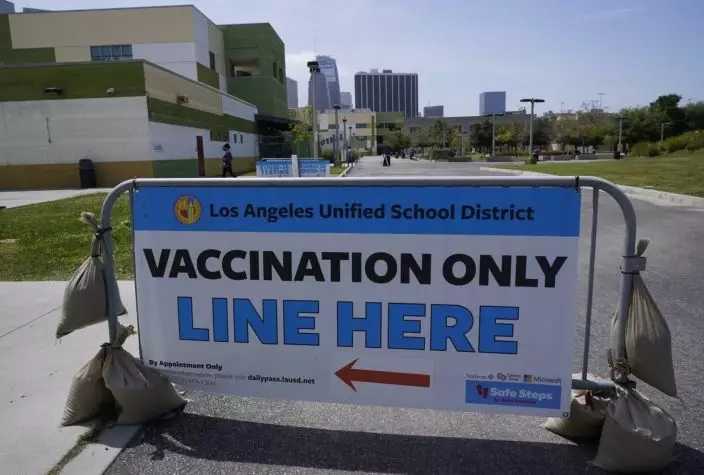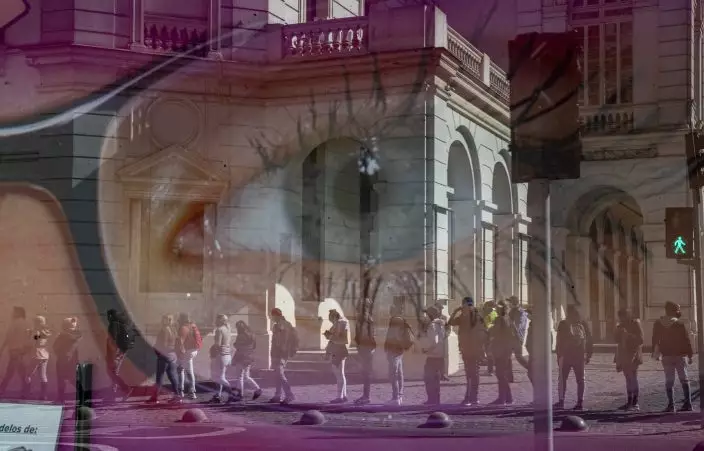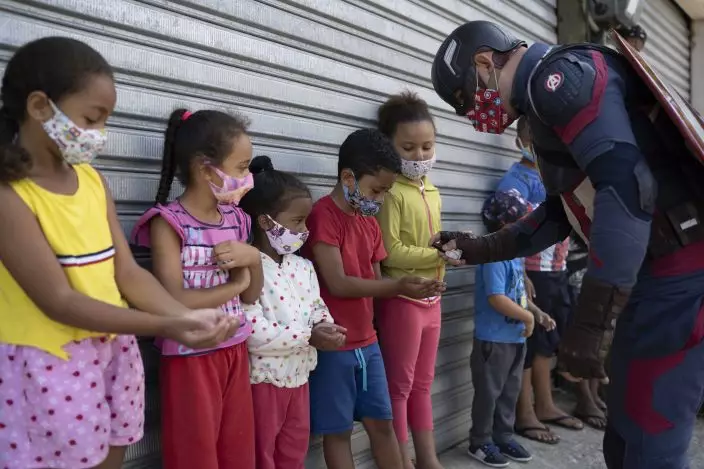MANILA, Philippines — President Rodrigo Duterte said it's uncertain when the Philippines can get adequate COVID-19 vaccines while warning more people will die and “the worst of times” is yet to come.
Duterte said his administration has done its best despite criticism and he could use emergency power, for example, to take over hotels if hospital room shortages worsen. But he said wealthy nations control the vaccine supply and other countries could hardly do anything but wait.
“When will we have that stocks sufficient to vaccinate the people? I really do not know. Nobody knows,” Duterte said in a televised meeting Thursday night with key Cabinet members. “I think before it gets better, we’ll have to go to the worst of times.”

A Los Angeles Unified School District banner for COVID-19 vaccination by appointment only site is posted at the Roybal Learning Center in Los Angeles Thursday, April 15, 2021. California Gov. Gavin Newsom is urging all schools in the state to reopen, saying there are no health barriers to getting children back into classrooms and ending distance learning. California's 11,000 schools have reopened or have set plans to reopen, but that is misleading because there is no uniformity in what it means for a school to be open. Some are offering one or two days of in-person instruction, mixed with distance learning on other days. (AP PhotoDamian Dovarganes)
“There’s no sufficient supply to inoculate the world. This will take a long time. I’m telling you many more will die here.”
The Philippines has received more than 3 million doses of Sinovac and AstraZeneca vaccines, most of it donated by China and through the COVAX arrangement by the World Health Organization. At least 1.2 million people have been given initial doses. The government aims to purchase at least 148 million doses to inoculate about 70 million adult Filipinos but the plan has faced supply problems and delays.
The vaccination delays have coincided with an alarming surge in coronavirus infections that the government has been scrambling to ease in the hard-hit capital and four outlying provinces.

In this Aug. 17, 2020 file photo, people are reflected in the window of an eyeglasses store as they wait outside the pension administration office, AFP, to apply for an early withdrawal of a percentage of their government pensions on the first day of the partial lifting of quarantine restrictions aimed at curbing the new coronavirus in downtown Santiago, Chile. Lawmakers in Chile have approved on Thursday, April 15, 2021, a third early withdrawal of a percentage of people's pension. (AP PhotoEsteban Felix, File)
The Philippines has long been a coronavirus hotspot in Southeast Asia with more than 904,000 infections and 15,594 deaths.
THE VIRUS OUTBREAK:
— China’s success at controlling the coronavirus outbreak leaves its public reluctant to get vaccinated

Military police officer Everaldo Pinto, dressed as superhero Captain America, sprays alcohol on children's hands amid the COVID-19 pandemic in Petropolis, Rio de Janeiro state, Brazil, Thursday, April 15, 2021. Pinto advises children on the need to protect themselves against COVID-19, distributing kits equipped with cleaning products and protective face masks to prevent the spread of the new coronavirus. (AP PhotoSilvia Izquierdo)
— Shortage of intubation drugs is the latest problem the pandemic has brought in Brazil
— China’s economic growth surged to 18.3% in 1st quarter, but the post-outbreak rebound is leveling off
— Louisiana is making a full-court press to get shots in arms, with creative outreach to make it easy to get vaccinated
— Follow AP’s pandemic coverage at https://apnews.com/hub/coronavirus-pandemic and https://apnews.com/hub/coronavirus-vaccine
HERE’S WHAT ELSE IS HAPPENING:
SACRAMENTO, Calif. — Gov. Gavin Newsom says nearly half of Californians eligible for vaccination have received at least one shot against the coronavirus.
He is urging more residents to sign up for appointments and not let apprehension get in the way of getting protected against the illness.
The nation’s most populous state on Thursday began vaccinating anyone age 16 and over regardless of occupation or health condition.
The move comes as California and other states have seen vaccine supplies rise in recent weeks. But officials are working to address hesitancy, particularly in some of the communities hit hardest by the pandemic.
NEW YORK — New U.S. government data show the country saw around 600,000 more deaths than usual during a 13-month span. COVID-19 was blamed for most of those deaths.
The Centers for Disease Control and Prevention released the estimate Thursday. It covers Jan. 26, 2020, to Feb. 27, 2021. COVID-19 was first detected in the U.S. in late January of last year.
CDC researchers said the biggest spikes in the deaths occurred in early April, late July, and the very end of December.
At least 75% of the deaths were directly tied to COVID-19, but the estimate includes deaths from all causes.
This week CDC released provisional data through the end of September 2020 that suggested drug overdose deaths for the year were far exceeding tallies seen in any previous year. The CDC said more than 87,000 deaths were reported over a 12-month period.


